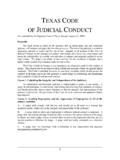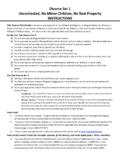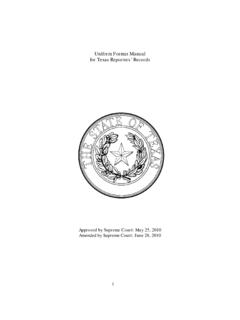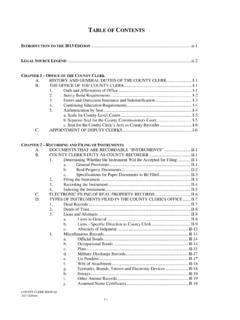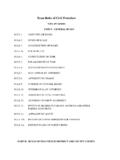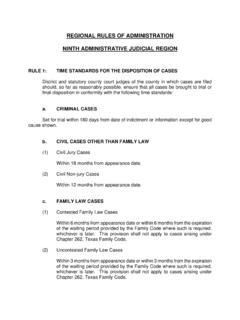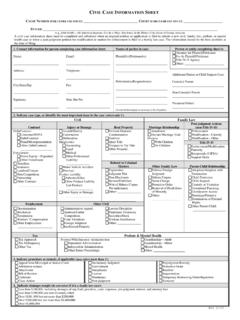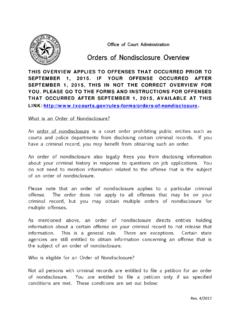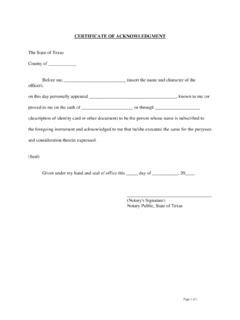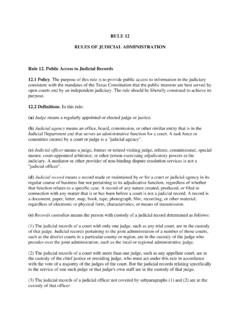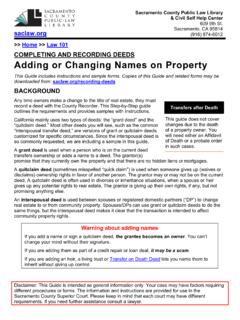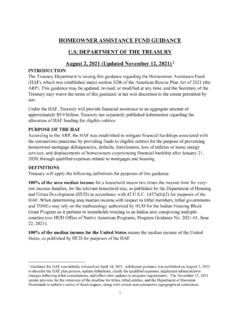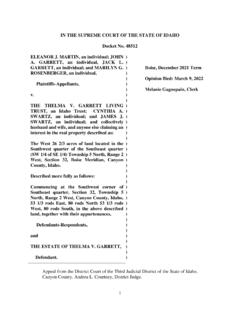Transcription of Opinion Summaries February 25, 2022 PROCEDURE – PRETRIAL
1 Opinion Summaries February 25, 2022. Opinion Summaries are prepared by court staff as a courtesy. They are not a substitute for the actual opinions. Opinions PROCEDURE PRETRIAL . Service of Process Bank National Association, as Trustee for Residential Asset Mortgage Products, Inc., Mortgage Asset-Backed Pass-Through Certificates Series 2005-EFC2 v. Dennis Moss, (Tex. February 25, 2022) [20-0517]. At issue in this case is whether Estates Code chapter 505 or section of the Civil Practice and Remedies Code is the appropriate method of service on a financial institution serving as a foreign corporate fiduciary. Moss is a homeowner in Dallas County. In 2005, Moss refinanced his mortgage and signed a home equity deed of trust .
2 Bank claims ownership of that deed by assignment. In 2017, Moss sued the Bank seeking to quiet title on his home, alleging that the Bank could no longer sell the property because the statute of limitations had expired. He served the Bank which was domiciled in Ohio and acting as a foreign corporate fiduciary in Texas by serving the Secretary of State, pursuant to chapter 505 of the Estates Code. Section provides that a foreign corporate fiduciary must appoint the Secretary of State as the fiduciary's agent for service of process in actions related to trusts, estates, and other matters. Bank did not appear in the quiet title lawsuit, and Moss obtained a default judgment. bank sought to set aside the default judgment on the grounds that it was improperly served and filed an equitable bill of review in the trial court.
3 The Bank contended that financial institutions may only be served pursuant to section of the Civil Practice and Remedies Code, which requires service on a financial institution's registered agent. The trial court agreed with Moss that service under the Estates Code was proper. The court of appeals affirmed, holding that both methods of service are valid and Moss properly effectuated service on the Bank via the Estates Code. The Bank appealed to the Supreme Court, which reversed the court of appeals' judgment. First, the court held that section of the Civil Practice and Remedies Code provides the exclusive methods of serving a financial institution. It then considered the comprehensive statutory landscape governing foreign corporations operating in Texas and determined that the Secretary of State, as an agent for service of process under Estates Code chapter 505, is not a registered agent as required by section The Court reasoned that the various laws governing foreign corporations doing business in Texas, including the Civil Practice and Remedies Code and Estates Code as well as the Finance Code and Business Organizations Code, do not, when read together, support the conclusion that the Secretary of State can be a corporation's registered agent for purposes of service of process section of the Civil Practice and Remedies Code.
4 Consequently, the Court held that Moss's service of the Secretary did not satisfy the service requirements of and the Bank was not properly served. The Court reversed the court of appeals' judgment denying the bill of review, rendered summary judgment setting aside the default judgment, and remanded the case to the trial court for further proceedings on the merits. MEDICAL LIABILITY. Discovery In re LCS SP, LLC, , 2022 WL (Tex. February 25, 2022) [20-0694]. At issue in this case is whether a plaintiff suing under Civil Practice and Remedies Code Chapter 74, the Texas Medical Liability Act, may obtain discovery of a skilled nursing facility's general policies before serving the expert report that the Act requires.
5 Section (s) stays discovery in health-care liability cases until the plaintiff serves the defendant with an expert report supporting the plaintiff's claim, unless the discovery seeks information that is related to the patient's health care.. Donna Smith was a patient at the Signature Pointe Senior Living Community, a skilled nursing facility owned by LCS SP, LLC. During that time, she allegedly suffered multiple falls, fracturing her ankle, shoulder, and hip. Her husband, Kenneth Smith, sued on her behalf, asserting health-care liability claims against LCS. under the Texas Medical Liability Act. Before serving LCS with the Act's required expert report, Smith sought discovery of LCS's general policies. LCS objected, arguing that the Act stayed discovery until after the service of an expert report.
6 The trial court denied Smith's motion to compel discovery. Smith petitioned the court of appeals for mandamus relief, and the appellate court granted a stay of Smith's expert-report deadline. The court then conditionally granted relief, holding that LCS's policies are relevant to assessing the appropriate standard of care that applies to the facility. LCS petitioned the Supreme Court for relief. Invoking the Act's stay of discovery in Section (s), the Court held that LCS's policies were not discoverable before Smith served LCS with an expert report. Although the Act excepts information related to the patient's health care from the stay of discovery, LCS's policies are not specific to Mrs. Smith's health care to exclude them from the discovery stay.
7 Smith argued that the Court's precedent in Diversicare Gen. Partner v. Rubio, 185 842 (Tex. 2005), meant that LCS's policies were necessarily discoverable before the service of an expert report. However, the Court had no occasion to examine the Act's stay of discovery in Diversicare. Though information may be relevant and discoverable, only that which is specifically related to the patient's health care may be had before the plaintiff serves a report. Thus, the trial court acted within its discretion in determining that production of general policies and procedures was premature. LCS also objected to the court of appeals' stay of the Act's expert-report deadline. The Court held that the appellate court's stay was an appropriate exercise of the court of appeals' power to grant any just relief under Texas Rule of Appellate PROCEDURE (b) to preserve the rights of the parties and the court's jurisdiction.
8 The Court conditionally granted mandamus relief for LCS. MEDICAL LIABILITY. Expert Reports Lake Jackson Med. Spa, Ltd. v. Gaytan, , 2022 WL (Feb. 25, 2022) [20- 0802]. The primary issue in this case is whether a plaintiff's claims constitute health care liability claims under the Texas Medical Liability Act. A preliminary issue is whether the Act prohibited the plaintiff from filing an amended petition after the Act's deadline for serving expert reports. Erika Gaytan sued Lake Jackson Medical Spa, Ltd., its employee, an aesthetician, and its owner, Dr. Robert Yarish, complaining that the aesthetician negligently performed various skin treatments that caused scarring and discoloration to Gaytan's skin. Gaytan originally sued for medical negligence involving an improper and negligent course of medical treatment.
9 Well after 120 days had passed, the defendants moved to dismiss Gaytan's claims because she had not served an expert report as required by the Texas Medical Liability Act. In response, Gaytan argued that the Act did not apply because she complained only about cosmetic skin treatments she received purely for aesthetic reasons. She filed a second amended petition the day before the hearing on the defendants'. dismissal motion, in which she omitted all references to the Act and to medical . treatments or negligence. Her factual allegations remained the same. The trial court denied the defendants' dismissal motion, and the defendants took an interlocutory appeal. The court of appeals affirmed. The Court held first that the courts could consider Gaytan's second amended petition.
10 First, the Act's 120-day deadline expressly applies only to the serving of an expert report, and not to the filing of amended pleadings. Second, the Act says nothing about whether or when a claimant can amend her pleadings, and the rules generally permit parties to freely amend their pleadings. Third, courts must consider the underlying nature of the plaintiff's claim rather than its label. Finally, the Act's dismissal process justifies the trial court's consideration of amended pleadings. As to the underlying nature of Gaytan's claims, the Court held that they were health care liability claims subject to the expert-report requirement. First, although Dr. Yarish never say Gaytan personally, a physician-patient relationship can arise without the formalities of a contract, and the lack of consent-to-treatment forms or the like does not preclude a relationship.
